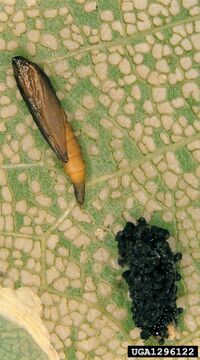Biology:Phyllonorycter roboris
| Phyllonorycter roboris | |
|---|---|

| |
| Scientific classification | |
| Domain: | Eukaryota |
| Kingdom: | Animalia |
| Phylum: | Arthropoda |
| Class: | Insecta |
| Order: | Lepidoptera |
| Family: | Gracillariidae |
| Genus: | Phyllonorycter |
| Species: | P. roboris
|
| Binomial name | |
| Phyllonorycter roboris (Zeller, 1839)
| |
| Synonyms | |
| |
Phyllonorycter roboris is a moth of the family Gracillariidae. It is found in all of Europe.
The wingspan is 7–9 mm. The forewings are shining white; a very oblique golden-brown fascia from base of costa, broad above, posteriorly fuscous-edged; four dark fuscous costal strigulae towards apex, anteriorly edged with an ochreous tinge, first oblique and nearly meeting a similar dorsal strigula; a golden brown apical spot containing a black dot; a dark apical hook in cilia. Hindwings are grey.[1]
Adults are on wing in June in one generation.
The larvae feed on Quercus cerris, Quercus dalechampii, Quercus faginea, Quercus frainetto, Quercus macrocarpa, Quercus pedunculiflora, Quercus petraea, Quercus polycarpa, Quercus pubescens and Quercus robur. They mine the leaves of their host plant. They create a large, lower-surface tentiform mine. Normally, quite close to the leaf base. The lower epidermis seems smooth, but has many fine length folds. The frass is deposited as a black mass in a corner of the mine.
References
- ↑ Meyrick, E., 1895 A Handbook of British Lepidoptera MacMillan, London pdf
 This article incorporates text from this source, which is in the public domain. Keys and description
This article incorporates text from this source, which is in the public domain. Keys and description
External links
Wikidata ☰ Q7189241 entry
 |





